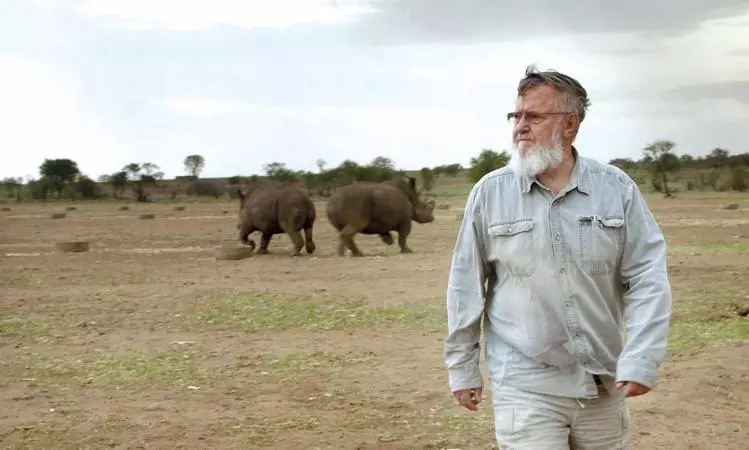
South African conservationist gives up, largest rhino farm in the world to be auctioned
text_fieldsJohannesburg: South African conservationist, John Hume, has spent the last 30 years and his wealth on attempts to save rhinoceros, a species critically endangered due to poaching. At the age of 81, he is giving up as his money has run out.
Later this week, he is set to auction his rhino farm to the biggest bidder. Spread across 20,000 acres, the farm has 2,000 rhinos and it is the world's largest rhino farm.
Speaking to AFP, Hume said: "I am left with nothing except 2,000 rhinos and 8,000 hectares (20,000 acres) of land. I've used all my life savings spending on that population of rhinos for 30 years. And I finally ran out of money. From a rhino point of view, it was definitely worth it. There are many more rhinos on Earth than when I started the project."
Hume said he has spent around $150 million on efforts to save rhinos. The former businessman runs a heavily guarded farm at an undisclosed location. He made it a safe haven for nearly 2,000 southern white rhinos which is a species hunted to near extinction in the late 19th century.
The farm has fences, cameras, heat detectors, and an army of rangers to ensure the animals are safe from poachers. Hume employs around 100 people at the facility.
Farm's head of security, Brandon Jones, said that the tight security is meant to discourage poachers. But he knows that they are only diverting the poachers from one farm. "We know that they will target areas where it is easier to penetrate and where the risk-reward ratio is to their advantage."
The full extent of security measures is a secret but it is clear that surveillance is the farm's biggest cost.
Whoever bids on the farm will have to be rich since the starting price is $10 million. "I'm hoping that there is a billionaire that would rather save the population of rhinos from extinction than own a superyacht. Maybe somebody for whom five million dollars a year is a small change," said Hume.
Along with the farm, its animals, land, and machinery, the deal also comes with a 10-tonne stock of rhino horns. Hume says it is negotiable as they are worth over $500 million on the black market. These horns are preventatively cut off from the animals as a way to dissuade poachers from killing them.
Hume is in favour of selling these horns and using that money to fund conservation projects. He also thinks creating a legal market for rhino horns is a solution but NGOs and the rest of the world do not agree. "I have the solution. But the rest of the world and the NGOs don't agree. And we are losing the war. Unfortunately, on the black market, a rhino horn from a dead rhino is still worth more than a live rhino."
The online auction begins on Wednesday.
South Africa is home to nearly 80% of the world's rhinos and poachers are drawn to the region. The horns of the endangered animal are used in traditional medicine for supposed therapeutic effects. Collectors of rare items are also driving the market. According to data, 448 rhinos were killed in the country in 2022. It is only three fewer than the year before. Increased protection has not worked in the favour of conservationists and rare animals.























